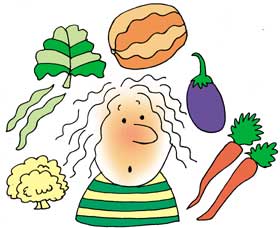 f you store spinach (palak) for too long, you might lose out on its benefits.
f you store spinach (palak) for too long, you might lose out on its benefits.
A new study conducted at Penn State University, USA, led by Luke LaBorde found that spinach stored at 39 degrees Farenheit loses its folate and carotenoid content at a slower rate than spinach stored at 50 and 68 degrees.
 This means spinach stored in a refrigerator at 39 degrees F retains more nutrients than spinach kept at warmer temperatures.
This means spinach stored in a refrigerator at 39 degrees F retains more nutrients than spinach kept at warmer temperatures.
While they found that substantial nutrient loss occurred at all storage temperatures, cooler temperatures retained more nutrients for a longer period of time.
Ideally, says dietician Seema Tarneja, you should buy, cook and eat up your vegetables on the same day.
This suggestion, of course, is impossible, for most young couples.
Your next bet: store your vegetables as carefully as possible.
"The trick when storing vegetables like spinach," says Tarneja, "is to maintain the moisture levels which, in turn, helps sustain the nutrient content to an extent."
Some ways to do this are as follows:
i. Use specially designed containers with air holes to protect items like spinach, coriander and curry leaves. These containers help them breathe as well retain moisture content.
ii. Use a cling wrap, a covering made of transparent sheets to cover foods stored in containers which have no lids.
iii. Use aluminum foil to wrap sandwiches, cover plates, etc.
iv. You can also use muslin bags to store vegetables. But make sure they do not become mushy and start rotting.
v. Keep any food item with a strong odour covered. Else, the other foods will be susceptible to the smell.
For instance, if you want to store chopped onions or ginger, keep them covered, else that delicious-smelling pudding will get a whiff of the onions soon.
Besides storage, there are more ways in which you can protect your food.
Humera Poonawala, registered dietician at Holy Family Hospital, Mumbai, says, "It is important to choose food carefully when buying it. You must also handle them correctly before cooking or storing it."
Here are some pointers:
1. Scrutinise everything before you buy it. Examine leafy vegetables carefully to see that they do not have eaten leaves and worms.
Store leafy vegetables in porous containers, free from dirt and silt.
2. When you buy tomatoes, make sure they are firm and not soft.
3. Do not make the mistake of chopping cabbage and then washing it. This leads to an increased nutrient loss. Wash the outside thoroughly; then chop.
When you buy cabbages, make sure the outer leaves are green, not yellow.
4. Soak cauliflower with a pinch of salt.
You need not do this for any other vegetable as the contact with water also results in a nutrient loss.
Instead, just wash the vegetable directly under running water.
5. Chop vegetables as close to the time of cooking or serving as possible. This is because the nutritional content is affected with exposure to air.
The Vitamin C content in potatoes, for instance, gets oxidised when the slices come in contact with air. So keep it wrapped, if there is a lapse in time before using it.
6. High protein foods like chicken and fish must be cleaned washed thoroughly, and then stored in the freezer. Never put them directly into the freezer.
Practising good habits such as these will help you keep your food fresh for a longer time!
DON'T MISS








